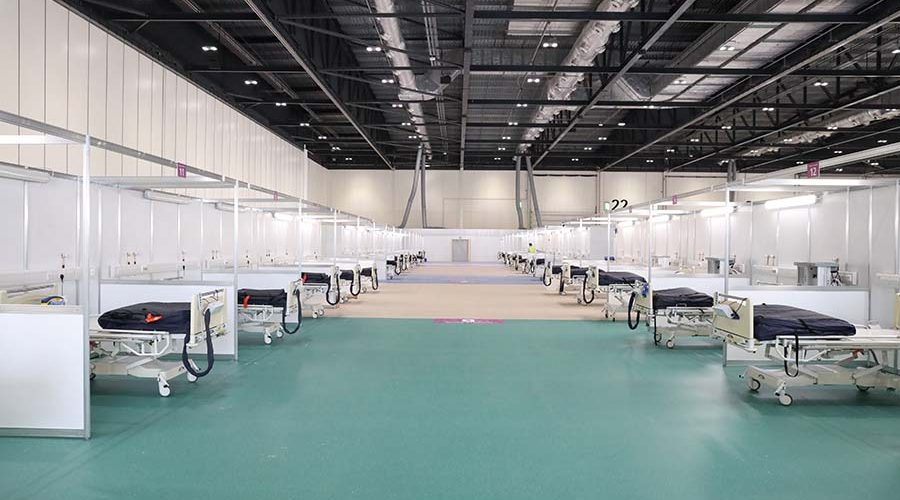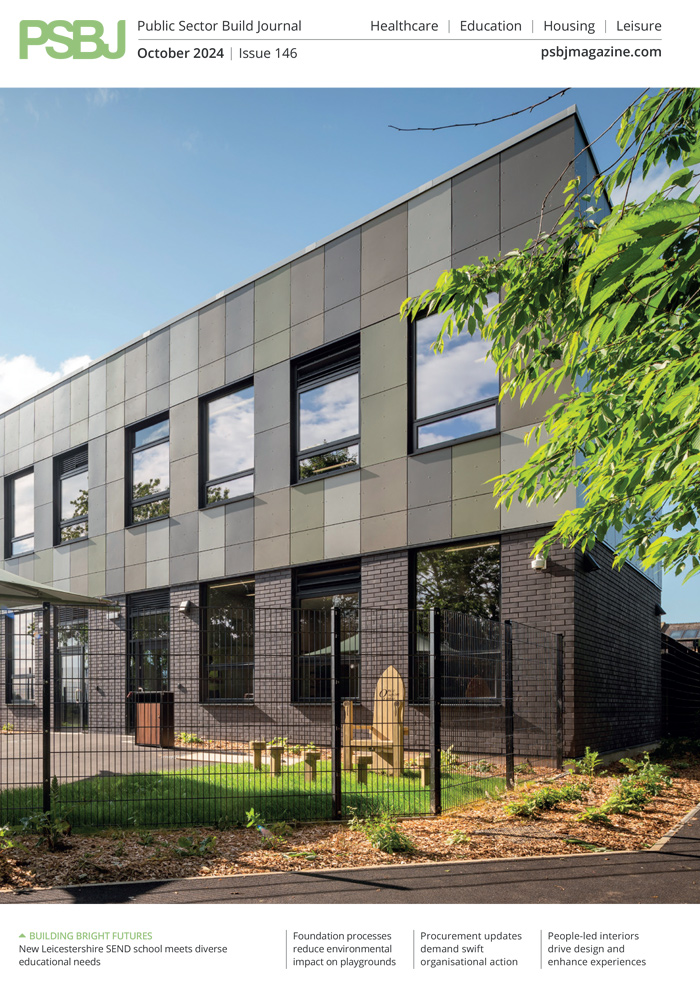When COVID-19 started its aggressive expansion throughout the world, one of the major fears was that healthcare providers would be overwhelmed.
James Latham
In preparation, the UK Government announced the NHS Nightingale programme. Involving the creation of temporary hospital wards within large exhibition, conference
and sporting venues, the programme required a significant effort from the whole construction sector.
Within nine days, the first temporary hospital opened – London’s ExCeL, with the capacity to treat 500 patients. By May, there were 10 temporary hospitals open throughout the UK, providing more than 4000 beds and with space to expand. It was a staggering achievement.
Material matters
The whole construction supply chain was under pressure, especially on the materials side. This is where James Latham came in. While traditionally known for its timber-based products, the firm has a much broader portfolio. Its Advanced Technical Panels (ATP) division, for example, includes a range of high-performance materials.
Steve Johnson specialises in health-related products at Lathams and works within the ATP team. He said: “Within two weeks, we’d distributed products to several NHS Nightingale hospitals. It was a huge team effort, with materials supplied from many of our product categories.
“Fortunately, as a large distributor, we had significant levels of stock ready to go straight away. It meant that we were well-placed to help the industry to respond as quickly as it did, often shipping products on the same day that they were ordered.”
Hospitals supplied from top to bottom
The products required by the NHS Nightingale hospitals were divided into two main categories: structural products such as doors, flooring and wall panels, and products for hygienic surfaces.
The latter, health-focused products were either antibacterial, which halt the growth of bacteria, or antimicrobial, which stop a broader range of viruses, organisms, protozoa, fungi and moulds, as well as bacteria.
One of these high-performing products was advanced thermoplastic KYDEX, a robust and inherently hygienic material that can be moulded to any shape. It contains Microban antimicrobial protection and can withstand tough cleaning products without any staining, fading or surface damage.
As a homogeneous product, i.e. the same all the way through, any damage to the top layer does not adversely affect its antimicrobial properties or visual impact, making it perfect for high traffic areas. Because of this, most hospital walls, doors and furniture are made of or coated in KYDEX.
One of the major orders was from Leisure Technique, which manufactured Integrated Panel Systems (IPS) units for the temporary hospitals. These are self-contained handwash stations that come fully assembled and include taps, sinks, pipework and wall panels. This makes them easier to move, install and clean. They are considered the most efficient approach for infection control and hygiene and are already used in hospitals.
Even surfaces without a specific medical use employed KYDEX. For example, patient bays at many of the hospitals needed an overbed table for storage and mealtimes.
Richard Hagan is Managing Director at manufacturer Crystal Doors. With lockdown approaching, he was working on plans to temporarily close the business when he got a last-minute call.
He said: “An enquiry came in for up to 8000 tables. Such a large order would need about five tonnes of material, so we quickly acted and bought every sheet of white KYDEX that we could find in the UK. Unfortunately, this wasn’t enough.
“Usually, there would be a long lead time of up to six weeks for orders, but time was clearly of the essence. Lathams and Sekisui really helped us – we placed our order on the Friday, and it was on a plane by the following Monday.
“We worked 24/7 for six weeks, supplying over 6000 tables for temporary wards across the country. It was fantastic to see how the supply chain came together, working hard to make sure that we could all do our bit to help the NHS.”
Getting it brand ready
This tough, resilient thermoplastic can be colour matched, and produced in a range of textures and finishes including realistic metallic or wood grains. This makes it especially useful for organisations that like to create branded environments.
This was true of the NHS Nightingale hospitals; Lathams already supplied KYDEX for NHS applications prior to COVID-19, and had sheets of the standard NHS blue, green and red that make up the main brand palette.
This was important both in terms of distribution speed but also for the recognition factor for users. Hospital staff would be shipped in at short notice and anything creating familiarity would provide operational gains.
As well as utilising its existing stock, Lathams was able to leverage its relationships with manufacturers around the world to ensure that products could be shipped in as quickly as possible. The team were arranging orders in bespoke quantities and size, which were then manufactured and made ready for transit within 48 hours, a significant reduction on normal lead times.
Temporary, but still with high standards
Just because the NHS Nightingale hospitals were temporary, it did not change the requirement for high-quality materials.
For example, temporary walkways were needed for the Dragon Heart Hospital in Cardiff, Wales. A converted Principality Stadium, the flooring would need to protect the pitch and be able to withstand high levels of traffic.
Buffalo Board, a heavy-duty, anti-slip product, was selected. Sealed with a hard-wearing acrylic resin, it has built-in water and chemical resistance and includes a slip-resistant mesh finish as standard.
And it was not just these temporary hospitals pushing demand for materials. Many existing hospitals had to significantly increase their capacity in their ICU facilities. This also had a knock-on effect on material availability, with Lathams prioritising these alongside the Nightingale orders.
Beyond healthcare
Commenting on the longer-term impact of coronavirus, Steve added: “The focus on hygienic materials is going to last for at least another year. At Lathams, we are busy supplying products to a range of other sectors as lockdown rules loosen, including retail, hotels, schools, offices and leisure operators.
“The priority is to supply products that can withstand the rigours of regular cleaning and help organisations to operate safely and securely. It is an investment worth making for the long term.”












